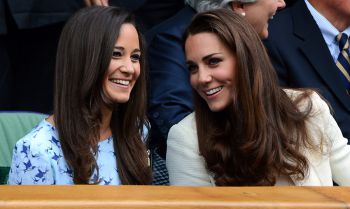Best friends like the Kardashians? Or rivals like the Milibands? How sibling relationships form
By: Anna Ford
Last updated: Thursday, 17 January 2019

Kate and Pippa Middleton are known to be close
While Kate and Pippa Middleton are known for their close bond, Noel and Liam Gallagher are apparently famous for their fraternal feuds. But what causes a relationship which ends in a rift, as opposed to a friendship which lasts a lifetime?
Psychologists at the University of Sussex are recruiting mums who are pregnant with their second baby to take part in a study to help understand how things change when a new sibling joins a family. The research will look at the changes families face when welcoming a second child. The researchers are interested in the first-born’s reactions, and mothers’ own well-being.
The research is led by PhD student Sumeyra Yalcintas and supervised by Professor Alison Pike who is an expert in family and child psychology and has appeared as an expert on Channel 4’s The Secret Life of 4, 5 and 6 Year Olds.
Professor Alison Pike at the University of Sussex says: “The birth of a second child is an exciting time for families. The first-born becomes a sibling, and parents have the needs of both a baby and young child to balance. This comes with challenges and delights! I have been fascinated by how and why children growing up in the same family often turn out so differently to one another.
"This project enables us to see the very beginnings of this process of siblings developing into individuals. This family transition also marks the start of a brand-new sibling relationship. Our bonds with brothers and sisters are often the longest-lasting of our lives, are emotionally intense, and can be a huge influence during childhood and beyond. We are eager to see this emerging relationship, and gain information about how families can promote the best possible start for siblings.”
PhD student Sumeyra Yalcintas at the University of Sussex says: “I’m excited to be helping to run this study. It will be interesting to see how family dynamics change during the transformation period, from three members to four. We’ll be looking at how the arrival of baby number two affects the family. We’re also interested in maternal well-being and how that is affected by available support and child temperament. We’ll be looking at marital relationships as well as the development of a sibling relationship. This may help us to understand how long term family dynamics form.”
Families are eligible if their first-born will be between 24 and 42 months on the date when their second child is due to be born. The study involves a home visit lasting 90-120 minutes. The researchers will play games with the mother and child, complete questionnaires, conduct a short interview and a computer task. As a token of thanks, the children will receive a small gift and certificate of participation.
Previous research from Alison and her colleagues relates to family and sibling relationships and how child wellbeing is affected by parental mental health.
Those interested in taking part in the study, called “3 to 4” - denoting the expanding size of the family - are invited to e-mail 3to4study@sussex.ac.uk or phone 01273 877288 with their name, first born date of birth, due date of the second born, and how they’d prefer to be contacted. The University will also keep families informed about the research via newsletters.
Professor Alison Pike will also be hosting a free public lecture at the University of Sussex called “Happier families: The kids (and mum and dad) are alright” on Wednesday 13 March which will look at research on what makes a happy family. This talk will highlight a pick-n-mix of findings from Alison, her collaborators and students that are not only of academic interest, but also inform how family well-being can be promoted in practice. Register for free to attend.
